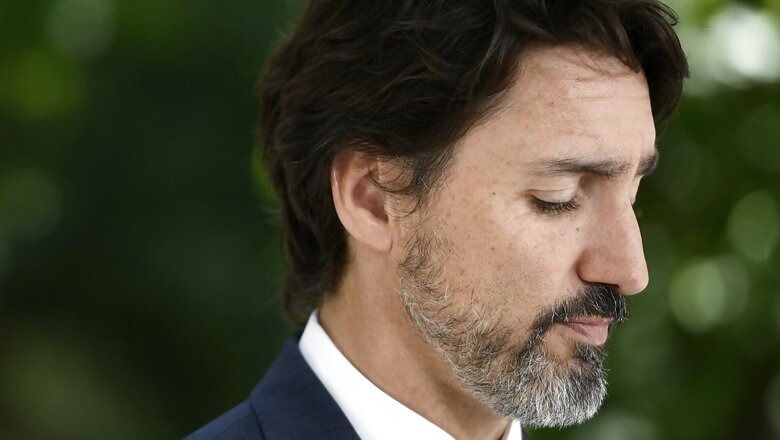
views
The ugly attack on the BAPS Swaminarayan Temple in Toronto has once again exposed Canada as a hotspot for pro-Khalistani elements sponsored by the Pakistani deep state as opposed to the image of a multicultural Canada that its Prime Minister Justin Trudeau loves to flaunt internationally. The temple was defiled on Tuesday with anti-India slogans scribbled on the walls of the premises.
This is not the first time that temples have been attacked in Canada. In 2021, a series of attacks on various Hindu temples in Brampton and Hamilton led to widespread protests by the local Hindu community. A statue of Mahatma Gandhi in Vishnu Mandir was again vandalised in the greater Toronto area in July 2022. Pro-Khalistani elements are infamous for targeting anyone who disagrees with their agenda. In February, a radio show host was attacked for denouncing these Khalistani elements in Brampton. Hindu Canadians are just 1.5 per cent of the total population of Canada and can be safely termed as a micro minority in the society. Meanwhile, the Indian High Commission as well as many Indian-origin lawmakers in Canada have condemned the incident.
While hate crimes against Hindu Canadians and attacks on Hindu temples by Khalistani elements have increased exponentially in the last few years, Canadian politicians have actively collaborated with the local Khalistanis. Sikhs for Justice, a banned outfit in India, was recently organising truck rallies in Canada for an upcoming Khalistan referendum event set to take place in a government-owned and operated facility — The Gore Meadow Community Centre.
Canada has the world’s largest Sikh diaspora at around half a million. What can be more shocking then than the fact that Jaspal Atwal, a Khalistani terrorist who led a failed assassination attempt on Punjab cabinet minister Malkiat Singh Sidhu, was a part of Prime Minister Trudeau’s delegation on his visit to India in 2018. Another terrorist, Talwinder Singh Parmar, chief plotter of the 1987 Air India plane bombing in Ireland, was debarred from entering next-door neighbour the United States, but Canadian authorities never took similar action against him. In 2018, an intelligence report in a small paragraph on Sikh extremism defined the Babbar Khalsa and International Sikh Youth Federation as terrorist organisations. However, even this portion was immediately retracted after protests by the members of the Sikh community.
It can’t be denied that Pakistan, where persecution of Sikhs has reduced the community to a mere 10,000 in number, is behind the resurgence of the Khalistan project. That’s another matter that the leading champion of the Khalistan ‘cause’ in Pakistan, Gopal Singh Chawla, is himself an aide of Lashkar-e-Taiba chief Hafiz Saeed.
However, the Canadian government’s inaction and vote-bank politics by appeasing Khalistanis may come back to haunt the country in a dangerous way. A report by a Canada-based think tank, Macdonald-Laurier Institute that looked into Khalistan as a geopolitical project of Pakistan noted that it threatens the national security of not only India but Canada as well.
The growing nexus between gangsters in Canada and Khalistani elements is becoming a huge security headache for both countries. Earlier this year an Indian singer, Sidhu Moose Wala, was shot dead, with Canada-based gangster Goldie Brar taking responsibility for the attack.
There is a growing realisation among the Canadian political class that its appeasement of Khalistanis will cost Canada its bilateral relations with India big time. India is increasingly adopting a no-nonsense policy on its sovereignty and territorial integrity along with a zero-tolerance policy on terrorism. The biggest example of India’s tough stand was the treatment meted out to PM Trudeau during his 2018 trip here. It turned out to be a dud visit in more ways than one.
India also appointed Ajay Bisaria as High Commissioner to Canada whose task was cut out to sensitise the Canadian government about the linkages between Khalistanis and Pakistan’s ISI. Interestingly, Bisaria served as High Commissioner to Pakistan in 2019 and is more than aware of the ugly designs of the Pakistani deep state.
Sikhs for Justice, the organisation which spearheads Khalistani activities, has often sought support from Pakistan for its propaganda exercises. Its leader, Gurpatwant Singh Pannu, was given a platform to address a virtual conference in the country. He even wrote a letter to a former PM of Pakistan seeking his support to “Free Punjab” and recognise “Khalistan”. In 2018, SFJ announced that it would open a permanent office in Lahore, Pakistan, to coordinate referendum activities and serve as an information centre for Sikhs. They also sent a representative to a Pakistani Embassy event in the US organised on Kashmir.
India had formally submitted a request in 2021 to the Canadian administration demanding a ban on SFJ. However, looking at the way this organisation is conducting a referendum event with no intervention by the Canadian authorities, it can be safely concluded that Indian demands have fallen on deaf ears. The recent defacing of a Swaminarayan temple proves that the Indian government must take up the matter with its Canadian counterpart. There are enough levers available for New Delhi to pull, one being the growing Canadian interest in a trade deal with India, the fastest-growing major economy in the world. The business councils in Canada are eager to seal a deal with India and this can be utilised to make sure the Canadian government acts on the Indian security concerns.
The author is a PhD in International Relations from the Department of International Relations, South Asian University. Her research focuses on the political economy of South Asia and regional integration. The views expressed in this article are those of the author and do not represent the stand of this publication.
Read all the Latest Opinion News and Breaking News here


















Comments
0 comment